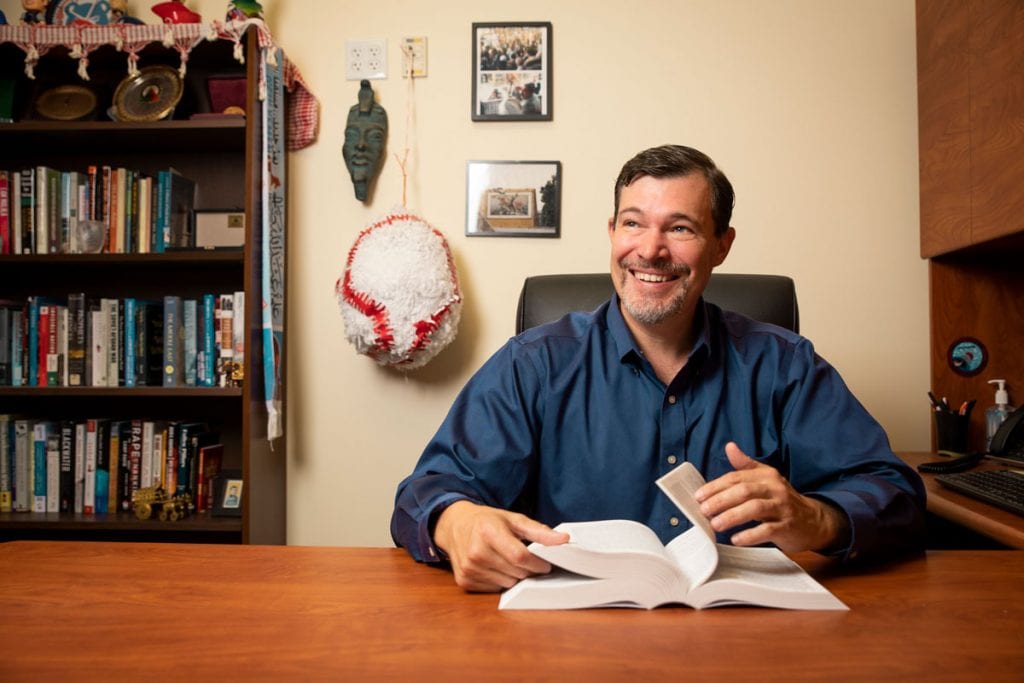10 Things to Know About Impeachment

David Dumke is the director of Global Perspectives and International Initiatives at UCF. (Photo by Lauren Schoepfer)
By Robert Stephens
In September, U.S. House Speaker Nancy Pelosi announced a formal impeachment inquiry against President Donald Trump. And while the word — impeach — has been around for four and half centuries, the history and meaning of it are often misunderstood. Few people may know this better than David Dumke.
Dumke is director of Global Perspectives and International Initiatives, but from 1994 to 2003 he worked for several members of Congress — both Republican and Democrat. He was often on the House floor during the impeachment proceedings involving President Bill Clinton, a place and time that even now provides him a clear field of view for what is happening in our nation’s capital — with one caveat.
“Everyone thought the late 1990s was the most partisan era ever,” Dumke says. “But today we’re in an uber-partisan era. Let’s hope the politicians, and all of us, can agree to disagree with civility and with respect to facts.”
Specifically, these are the things he’d like to stress:
- Congress still has a governing job to do. “When President Clinton was being investigated [for statements about his relationship with intern Monica Lewinski], the members of Congress still functioned as they were supposed to function. They worked on budgets, negotiated welfare reform and made sure taxpayers’ money was being spent correctly. That’s their primary job at all times.”
- Impeachment is a vague concept. “Officially, an impeachable offense is for ‘treason, bribery, or other high crimes and misdemeanors,’ but there’s no definition for what some of those are. So it becomes a political process. The bar is set in the minds of those bringing the case. Which is probably why we hear the word used so often.”
- There are punitive tools other than impeachment. “Presidential impeachment should be considered a nuclear bomb in politics. Congress can use other forms of leverage before going there. They can freeze spending in certain areas, for example. In 1998, Speaker of the House Newt Gingrich could have stopped the impeachment process by censuring President Clinton. A censure is an official reprimand for bad behavior. Perhaps there would have been some sense of unity rather than the gut-wrenching process of impeachment.”
- Impeachment can be dangerous. “It’s easy to say we’re dealing with one president. But we have to be conscious of the precedent an impeachment creates. It is not meant to be a mechanism used just because you don’t like a president or his policies. We wouldn’t want it to become a routine process down the road.”
- A president has never been convicted and removed from office. “Both Andrew Johnson [in 1868] and Bill Clinton [in 1998] were impeached by the House, but neither was convicted in the Senate. Richard Nixon most likely would have been impeached and convicted by both branches, but he resigned in 1974 before any votes could take place.”
- No one knows who will ultimately win. “The court of public opinion will decide if impeachment is fair or unfair. After Bill Clinton’s impeachment, the Democrats actually gained a few seats in the House of Representatives. In fact, President Clinton enjoyed his highest approval rating during his final two years in office — as high as 73 percent.”
- Impeachment can be really messy. “The case against President Clinton revolved around his sexual relationship with Monica Lewinski. Ironically, Gingrich initiated the impeachment … and then resigned because of his own affair before the vote even took place. Bob Livingston replaced Gingrich. I was there when Livingston also resigned because of an affair, about a month after he’d become speaker-designate. Like I said, you never know who will win in the end.”
- Everyone has to keep moving forward. “I remember a surreal moment on the floor of Congress when the U.S. was involved in bombing strikes against Saddam Hussein’s Iraq. This was during impeachment discussions. Impeachment proceedings did not put a stop to everything else.”
- We live in a charged era. “People now see things through very partisan filters — it’s all or nothing. Yes, our government needs the checks and balances, but it’s also set up for everyone to work together, despite disagreements. This president, however, hasn’t necessarily set a unified tone. Everyone in D.C. needs to remember the responsibility they have to do what’s best for the people.”
- Once the process starts, you can’t rein it back in. “The impeachment train has left the station. History will tell us where it’s about to take us — good or bad.”
